PrologueHe lives the life he wanted to live, he got there with nothing but his own will and drive, and he let us in, let us live it with him and through him. For all that, no one begrudges him his time in the sun now.
Gerhard Berger is a fixture in the paddock, a face that is familiar to anyone with even a passing interest in Formula One over the last two decades, and it's strange to think that we won't be seeing him again for a while. You get used to things, and it's hard to imagine not seeing the Austrian's smiling face in the BMW motorhome. He's been going to fewer races this year since announcing his pending retirement, and with the negotiations between BMW and Williams successfully ended at the Nurburgring two weeks ago, there's less reason for him to be there, but his final day in September will still be a sad one for many. Berger came from a wealthy family, as is common in the Formula One paddock, but unlike most his family didn't want him to go racing and put up as many obstacles as they could to dissuade him. He did it anyway, because it was what he wanted to do, and to prove to himself and to everyone that he could. Perhaps it was just sheer bloody-mindedness, a trait that he shares with his compatriot Niki Lauda, but it could just as easily be a passion that he has had since the day he first sat in a kart as a child and learnt first hand the addiction that is speed. Whatever the reason, the speed with which he worked his way up into the big game is matched only by the likes of Mike Thackwell before him or Kimi Raikkonen after - he decided that it was the life he wanted, and made it happen within the span of two years. He made his Formula One debut at home with ATS (powered by a BMW engine, as it happens), was in the points at the next race, and then never looked back. The podiums came, and then the wins, but what most people will remember from his long career is the sheer love of life that was manifest in everything he did. His sense of humour is legendary - from the stunts like sneaking into the Brabham pit to deface pictures of Nelson Piquet; to throwing the keys of Ayrton Senna's car out the window while they were driving to Monza (which necessitated a helicopter to extricate them from the fans mobbing their car); to filling Senna's bed with frogs. Each of these stunts were met by those around him with a wry chuckle, a rolling of their eyes and a comment along the lines of "oh, that's just Gerhard". Berger has always had a lot of friends, but the three that combined to define the different parts of the man are Senna, Jean Alesi and Barry Sheene. "He taught me a lot about our sport. I taught him to laugh" - this is how Berger explains the relationship with the great Brazilian, and it's clear that his three seasons with the McLaren team rubbed the rough edges from a fast but wayward driver into someone who could take his chance and win. Sheene was those rough edges, the larger than life personality that would do anything, anytime without thinking of the results (on track or off), the side of him that made him use his fame and his fortune to do whatever the hell he wanted to do, when he wanted to do it. And Alesi, the mercurial driver who personified Gilles Villeneuve albeit without the wins, showed Berger how he could combine the two sides and still have time for his family, for the people around him who loved him so. The other person who helped mould Berger was his father. Every man is defined in part by their father, through a desire to either be him or defy him, and Berger lived on both sides of this equation at various times. He defied his father by getting into racing in the first place, going against his father's expressed wishes for his son to study and follow in his footsteps by joining the family's trucking business, but he came around in the end. In Germany 1997, after suffering a debilitating sinus problem and missing three races, no one expected anything from the aging driver, but he defied all expectation by taking pole position, fastest lap and winning the race, driving faster and faster as though being carried to the end, and decided there and then that his retirement was inevitable. He dedicated the win to his father, the man he had loved for so long and just lost in a plane crash, and then moved towards the business career his father had always wanted for him. The move turned into the role of sporting director for BMW, then just returning to Formula One after so long away with the Williams team. Most people expected the position to be a figurehead role, a position to let him stay in the sport that he loved now that his driving days were over, but he defied expectation by working sixteen hour days to make sure that the team was the success that he knew it could be. And that success is now there for everyone to see, his business acumen and his racing knowledge combining to great effect. Reflecting on his long career, the two of us sitting in the BMW motorhome, he noted: "I had a great job with BMW, fantastic. I put in all my experience that I got over many years. I had great people and built up a team around me over many years, everything was perfect." "But," he adds quickly, "the nicest thing in racing is to drive a racing car at the limit." Those days are over for him now, and perhaps it hurts to watch the current drivers having the fun that was once his. He has never once driven a BMW Williams, not wanting to mix business with pleasure, but maybe he'll be given the opportunity now that he is retiring. When I asked him about this possibility, and whether he'd be able to do it, he laughed and said: "I would be able to move it around, yes, but could I move it around quick? I don't know!" After all these years he's decided it's time for a long overdue break, and after two decades in the sport, he deserves it. "I want to have a bit more time for myself," he says, "to do a bit more sport again, take some more time for my children - they are six and seven, and I think I could at the moment take two years to give them a bit more time. And on my private side I have a few areas where I would like to work a bit closer and a bit harder on it." This private side includes his family's trucking business, run now by his sister, as well as his sponsorship agency, run out of Monaco and which would allow him to make use of his huge array of contacts in the paddock, as well as give him a side door to return if he so wished. And he will be back, of course. After all this time in racing nothing will be able to stop him coming back to the sport eventually. "I cannot see my life without racing," he says. "What I'm definitely going to do - I don't know, and I don't want to know, because I want just now, for a year, to relax a little bit." But we had one more job for him before the relaxation could start. "Nice and easy," I told him. "No interview - I'm just going to show you a few photos and see what you've got to say about them." The first photo put a wide smile on his face, one that stayed in place as he flicked through photos drawn from across his career. And then he started to talk...
0 Comments
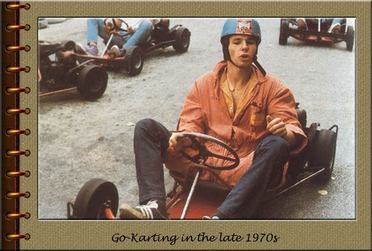 "Ahhh..." Berger sighs. "So I should tell you where it was, when it was, what it was?" "Not really. I know where it was and everything," I explain, "I just..." Berger smiles, and picks up the first picture - "You know when this was?" Actually, I don't... "That was in Riccione," he begins. "It's near Rimini, the karting place I always went to when I was a boy." "Nice overalls," I remark. "Nice overalls? Yeah, yeah, right..." he smirks. "That was just a rental from the place! And it was a really funny thing, you know... "When I was a boy I liked to go karting so much and do the racing, but my father didn't like it and didn't support me, and so I had no chance. So then what I did when I was a little bit older, when I was about 14, 15, 16, I used to go with the truck drivers" - Berger's father ran a successful trucking company in Austria - "to Italy and Germany, because they always used to let me drive when they were tired. They could sleep and I could drive the trucks - that was great stuff. "So we used to go pick up paprika in Ancona and fill the whole truck; 24 tonnes of paprika to take to Germany. So what I used to do was stop at this karting place, open the truck, and for each time I was driving, I gave them paprika - I paid in paprikas! "I remember once when I stopped the truck for three days - I disappeared, and nobody could find me. I was paying with the goods of the truck, and the problem was I was missing a lot when I came back. And, there was also a weekend between when it was hot, and the whole thing was gone because it took too long for me to get to Germany and all the paprika was broken, it was missing - there was a big casino going on! But that's how I used to pay for my karting." 7/7/2003 0 Comments 2. F3 Race in Monaco, 1984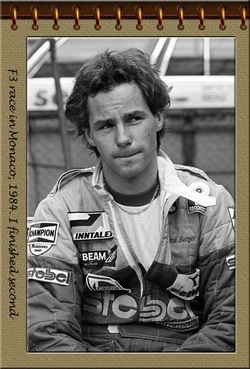 "That was the year when I finished second?" Berger asks, looking at a picture of himself at Monaco, in 1984, after a Formula Three race. "Yes," I tell him. "It was hurting me a little bit," he recalls, "because I finished second - Ivan Capelli won the race - but some races later they found out that he was cheating on the airbox. It was the Italian Loteria in Formula 3, where I also finished second and he won; they opened his engine and he was cheating on the airbox. And I always thought that if it was like this I could also have won the Monte Carlo race. But anyway, yeah, I remember this race. "It was the race where John Neilson showed me very carefully the whole track and told me where not to use the kerbs in the chicane down in the harbour because it's very dangerous, and then he had a huge crash there exactly on this place where he told me not to do it! And it was a very big crash - he broke his hips and everything. Yeah, I remember this race." "You never won there," I tell him. "Is this your big regret in racing?" "No," he replies. "I don't regret anything." 7/6/2003 0 Comments 3. Mexico 1986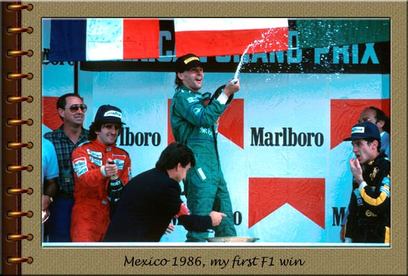 "I remember this win," Berger says. "Of course I like it a lot, but I remember even more that it was a fantastic trip to Mexico with some friends of mine, and all we had in our heads was to party in Mexico City and go down to Acapulco..." He starts laughing, and continues: "And then, in the end, I ended up with the win in the race, and that was very unexpected, you know, so that was even better!" DC: James Hunt and some of those guys were known to sometimes drive a little hungover - you were known for having a lot of fun on race weekends, so did you ever do anything like that? Berger: "Yes, I used to. I used to party, I used to race and party, and there was never any question should I party because I had a race, or because I had a race should I go to a party - I always tried to do both! That means a lot of time it was a compromise on both sides because I would have to leave just when the party starts to get nice, and I couldn't win because I was still a bit dead from the night before!" 7/5/2003 0 Comments 4. Monza, 1988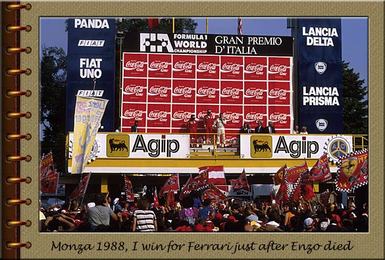 The win at the 1988 Italian Grand Prix was just after Enzo Ferrari - the old man - died. "It must have been very emotional for everyone in the team," I note. Berger nods. "The good thing about this race was that McLaren was extremely dominant this season - mine was the only win not for McLaren, every other one was McLaren-Honda - and I visited the factory some days before the race and was joking with the team. I said, 'I just have to go quickly to Monza to win the race.' It was Marco Piccinini at the time, or Piero Lardi - I don't remember anymore - and he looked at me with big eyes. And I said 'sure, I'll go and win the race - if you give me the car that I'm driving there.' And they said 'of course, if you win the race you can have your race car.' "So I won it, and up on the podium I was already thinking of picking up the car quickly after parc ferme and going home with it!" DC: Do you still have it? Berger: "No - I sold it two days later! But now I would like to have it - I would be very happy if I could get it back." DC: Jean Alesi still has one of his old cars at home... Berger: "Yeah, Jean was always collecting everything." 7/4/2003 1 Comment 5. Hockenheim 1997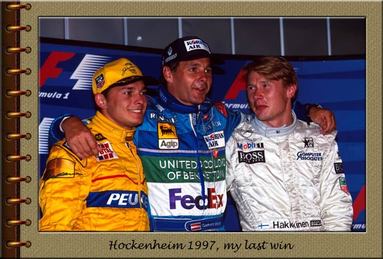 "Was this my last win?" Berger asks, and then answers: "Yes. Well, that was a very special win - I lost my father some days before in a plane crash. It was a hard time; I had some problems at Benetton with Flavio, I was sick, I was not healthy - but everything came together, and nobody was expecting that I was going to do anything. Everybody was looking at me when I arrived to see what I'm doing there; I missed three races before, and I had a sinus operation. So everyone just had a kind of fake smile for me and said 'Gerhard, you are 37, you're sick, you just lost your father - you should stay at home and stay in bed', and that gave me some extra inspiration. "That proved to me that really the most you can do is with the head; because this weekend I didn't have a real dominating car, I didn't have the physical conditions to win the race, I didn't have the mental conditions to win the race, but I had pole position, quickest lap and I won the race. So it showed me that it's the mental preparation you need." DC: I remember watching the race and you were top in every session - you took pole, you were so much faster than you were all season. Do you know why? Berger: "I'd been in the shit, and when I've been in the shit before and needed to do a new contract I always found another half second in me!" DC: After this race you announced pretty quickly that you were going to retire. Berger: "I knew already before. I thought already that I wasn't going to drive for Benetton, but I knew already before that I was going to retire. And if I had a strong character I would have gone away from the podium and said 'bye bye - that's it', and I was thinking about it, but as I'm not strong if it comes to money I said 'oh shit, there's too much money out, and I have to first collect the money!'" DC: You would have to give them some money back if you didn't finish the season? Berger: "No - they wouldn't pay me for the rest of the season!" 7/3/2003 0 Comments 6. Imola 1989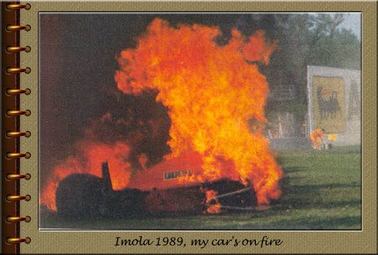 "That was the grill party in Imola!" Berger laughs. "That doesn't look promising!" DC: What was it like to sit inside of that? Berger: "Warm - it was warm! No, at this moment I was unconscious - no problem." DC: And at what moment did you wake up? Berger: "When Professor Watkins was sitting on my shoulders and trying to get this pipe into my throat, and it hurt and was uncomfortable, and that's when I woke up and saw my hands and everything was burnt. I didn't know - I thought I was on holiday - I remember I woke up and said 'where am I, am I on holidays or something?' And there is Sid sitting on me and trying to get this bloody pipe into me, you know. I was uncomfortable." DC: What did Sid say to you? I know you were good friends Berger: "Sid didn't understand that I didn't realise where I was and what I was doing, and he explained that I had an accident and I looked at my hands... But the real funny thing on this was I was burnt, I was hurting a lot and my overalls were full of fuel, and they brought me back to the hospital at the circuit. They tried to wash my hands from the burning and the fuel, but what really hurt me the most was my balls, because I was sitting in fuel. And there was this doctor and nurse and it was hurting like hell, and I thought, how can I explain this to get the fuel off my balls, you know!" 7/2/2003 0 Comments 7. Monaco 1994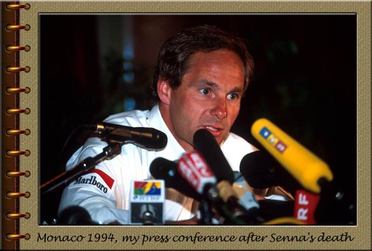 "I was in a good mood there," Berger says, sarcastically. DC: This was when you announced that you were going to continue racing, after the weekend of Imola 1994... Berger thinks for a while. "There's not a lot to say - it was a terrible weekend. I was already a long time into the career and so I thought it's a good moment to think should I go, should I not go. But honestly this I did already on Saturday after the qualifying after Ratzenberger's accident - nothing to do with Ayrton's accident - and then I made a decision on Saturday afternoon and it was already clear before Ayrton." DC: What made you decide to stay? Berger: "I still just loved it so much. I said, 'do you still want to take the risks?' And I decided that yes, I do, because I just loved it so much." 7/1/2003 0 Comments 8. Monza 1995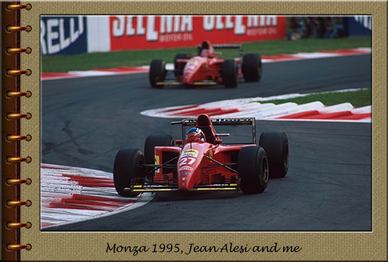 "Give me another photo," Berger says, "I don't like to be behind him!" DC: This was the race where his camera fell off and hit your car... Berger: "Oh yes - thank you very much! I was catching him, and I have to say it was an unbelievable situation - the camera came like a knife through my front suspension. I saw it coming and I couldn't move anymore. And that wouldn't work out well if I got it in the head! But that would have been a great race because I was just catching him, and we would have had some fun then!" DC: Was he your most fun teammate? Berger: "Him and Ayrton, yes, are the ones I like the most. But Alesi was... great, yeah." DC: I've seen you a couple of times recently in the paddock, and when Alesi turns up to the races you just have a big smile on your face Berger: "Yes, Jean is my friend - I like him, and he still hasn't changed a lot, and I miss him. We had a really, really good time together." 6/30/2003 0 Comments 9. Juan, Ralf and Me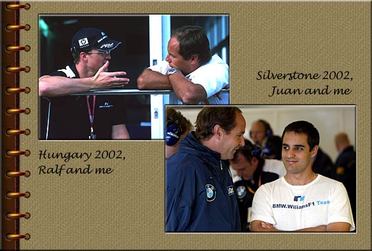 "I like the guy," Berger says, pointing at a photo of Juan Pablo Montoya. "He's very simple, he's a racer inside the car, outside the car, and he has a good style. He's one of my favourite drivers." DC: He reminds me very much of you, actually Berger: "People tell me this - it's difficult for me to say - but I like him, yeah." DC: Now, what about Ralf Schumacher? "Ralf, yes...." Berger pauses for a moment. "You know, the interesting thing is with this one" - he points to Montoya - "is you always have the feeling he's a superstar, it's very special, but with this one" - now he points to Ralf Schumacher - "you don't have the feeling. But when you compare the points and the results it's the same, over many years, so I think you have the same level of drivers here. He's a nice guy too, Ralf, but he's very different to Montoya. I like both of them, and I think it's a fantastic combination for Williams." DC: I know what you mean - they are very different personalities, but yet their results are exactly the same Berger: "Yes, but if you went out and asked the results of people they would say no, Montoya has much better results, but it isn't true - they're the same. And I really would like to be fair because this guy - Ralf - is doing a good job. "But at the end of the day, everybody is comparing him to his brother, and his brother is very, very outstanding. There's nothing wrong with that, you know - nothing to be ashamed about being behind the brother, because he is the best in the field." DC: Do you think because Ralf and Juan are so different, with different strengths, they make a good pairing as teammates? Berger: "Yeah, I think it's a great combination for us." |
 RSS Feed
RSS Feed